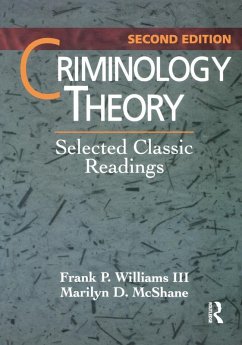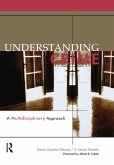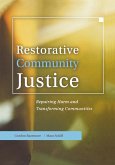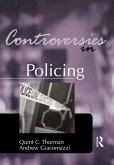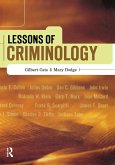48,95 €
48,95 €
inkl. MwSt.
Sofort per Download lieferbar

24 °P sammeln
48,95 €
Als Download kaufen

48,95 €
inkl. MwSt.
Sofort per Download lieferbar

24 °P sammeln
Jetzt verschenken
Alle Infos zum eBook verschenken
48,95 €
inkl. MwSt.
Sofort per Download lieferbar
Alle Infos zum eBook verschenken

24 °P sammeln
- Format: PDF
- Merkliste
- Auf die Merkliste
- Bewerten Bewerten
- Teilen
- Produkt teilen
- Produkterinnerung
- Produkterinnerung

Bitte loggen Sie sich zunächst in Ihr Kundenkonto ein oder registrieren Sie sich bei
bücher.de, um das eBook-Abo tolino select nutzen zu können.
Hier können Sie sich einloggen
Hier können Sie sich einloggen
Sie sind bereits eingeloggt. Klicken Sie auf 2. tolino select Abo, um fortzufahren.

Bitte loggen Sie sich zunächst in Ihr Kundenkonto ein oder registrieren Sie sich bei bücher.de, um das eBook-Abo tolino select nutzen zu können.
This highly acclaimed criminology text presents an up-to-date review of rational choice theories. It incorporates current examples of deterrence research regarding domestic violence, drunk driving, and capital punishment, and features thought-provoking discussion of the relativity of crime.
- Geräte: PC
- mit Kopierschutz
- eBook Hilfe
- Größe: 3.92MB
Andere Kunden interessierten sich auch für
![Understanding Crime (eBook, PDF) Understanding Crime (eBook, PDF)]() Susan Guarino-GhezziUnderstanding Crime (eBook, PDF)52,95 €
Susan Guarino-GhezziUnderstanding Crime (eBook, PDF)52,95 €![Violence (eBook, PDF) Violence (eBook, PDF)]() Margaret ZahnViolence (eBook, PDF)43,95 €
Margaret ZahnViolence (eBook, PDF)43,95 €![Restorative Community Justice (eBook, PDF) Restorative Community Justice (eBook, PDF)]() Gordon BazemoreRestorative Community Justice (eBook, PDF)43,95 €
Gordon BazemoreRestorative Community Justice (eBook, PDF)43,95 €![Controversies in Policing (eBook, PDF) Controversies in Policing (eBook, PDF)]() Quint ThurmanControversies in Policing (eBook, PDF)39,95 €
Quint ThurmanControversies in Policing (eBook, PDF)39,95 €![Rhetoric of InSecurity (eBook, PDF) Rhetoric of InSecurity (eBook, PDF)]() Victoria BainesRhetoric of InSecurity (eBook, PDF)40,95 €
Victoria BainesRhetoric of InSecurity (eBook, PDF)40,95 €![Lessons of Criminology (eBook, PDF) Lessons of Criminology (eBook, PDF)]() Gilbert GeisLessons of Criminology (eBook, PDF)115,95 €
Gilbert GeisLessons of Criminology (eBook, PDF)115,95 €![Biosecurity, Economic Collapse, the State to Come (eBook, PDF) Biosecurity, Economic Collapse, the State to Come (eBook, PDF)]() Christos BoukalasBiosecurity, Economic Collapse, the State to Come (eBook, PDF)40,95 €
Christos BoukalasBiosecurity, Economic Collapse, the State to Come (eBook, PDF)40,95 €-
-
-
This highly acclaimed criminology text presents an up-to-date review of rational choice theories. It incorporates current examples of deterrence research regarding domestic violence, drunk driving, and capital punishment, and features thought-provoking discussion of the relativity of crime.
Dieser Download kann aus rechtlichen Gründen nur mit Rechnungsadresse in A, B, BG, CY, CZ, D, DK, EW, E, FIN, F, GR, HR, H, IRL, I, LT, L, LR, M, NL, PL, P, R, S, SLO, SK ausgeliefert werden.
Produktdetails
- Produktdetails
- Verlag: Taylor & Francis eBooks
- Seitenzahl: 366
- Erscheinungstermin: 2. März 2015
- Englisch
- ISBN-13: 9781317523031
- Artikelnr.: 42508201
- Verlag: Taylor & Francis eBooks
- Seitenzahl: 366
- Erscheinungstermin: 2. März 2015
- Englisch
- ISBN-13: 9781317523031
- Artikelnr.: 42508201
- Herstellerkennzeichnung Die Herstellerinformationen sind derzeit nicht verfügbar.
Frank P. Williams III has taught at departments in five universities and has published a substantial number of articles, research monographs, government reports, and books. He has served as a department chair (Cal State, San Bernardino), Assistant Director for Research (Sam Houston State), and Coordinator of the Doctoral Program (Prairie View A&M), and directed numerous research projects. He has served on or been elected to the boards of national scholarly organizations, chaired a major division of a national organization, and chaired/served on numerous national/regional committees. He has been an editor or deputy/associate editor for several journals and publisher's book and monograph series.
Marilyn D. McShane is currently a professor of criminal justice at the University of Houston, Downtown. Over her career, she has taught in doctoral, masters and undergraduate programs, as well as served as a program director in the Texas Department of Corrections. She has also been a department chair and director of both academic centers and institutes, held office and served on a number of national criminal justice professional organization boards, and served as a reviewer of research proposals for the National Institute for Justice. She has a substantial number of publications and research and training grants and has been involved in editorial work for book series and journals for the past 20 years. Her publications include encyclopedias, several books, and numerous journal articles. Correctional issues, criminological theory, and management are among her academic interests.
Marilyn D. McShane is currently a professor of criminal justice at the University of Houston, Downtown. Over her career, she has taught in doctoral, masters and undergraduate programs, as well as served as a program director in the Texas Department of Corrections. She has also been a department chair and director of both academic centers and institutes, held office and served on a number of national criminal justice professional organization boards, and served as a reviewer of research proposals for the National Institute for Justice. She has a substantial number of publications and research and training grants and has been involved in editorial work for book series and journals for the past 20 years. Her publications include encyclopedias, several books, and numerous journal articles. Correctional issues, criminological theory, and management are among her academic interests.
Section I: THE FOUNDATIONS OF MODERN CRIMINOLOGY CLASSICAL SCHOOL Cesare
Beccaria On Crimes and Punishments CLASSICAL SCHOOL Jeremy Bentham
Introduction to the Principles of Morals and Legislation POSITIVE SCHOOL
Cesare Lombroso Crime: Its Causes and Remedies Section II: THE CHICAGO
SCHOOL AND DERIVATIVES ECOLOGICAL THEORY Clifford R. Shaw & Henry D. McKay
Juvenile Delinquency and Urban Areas CULTURE CONFLICT THEORY Thorsten
Sellin The Conflict of Conduct Norms DIFFERENTIAL ASSOCIATION THEORY Edwin
H. Sutherland Differential Association SOCIAL LEARNING THEORY Ronald L.
Akers A Social Learning Perspective on Deviant Behavior Section III: STRAIN
AND SUBCULTURE THEORIES ANOMIE THEORY Robert K. Merton Social Structure and
Anomie SUBCULTURE THEORY Albert K. Cohen Delinquent Boys DIFFERENTIAL
OPPORTUNITY THEORY Richard A. Cloward & Lloyd E. Ohlin Delinquency and
Opportunity FOCAL CONCERN THEORY Walter B. Miller Lower Class Culture as a
Generating Milieu of Gang Delinquency Section IV: LABELING THEORY LABELING
THEORY Howard S. Becker Outsiders LABELING THEORY Edwin M. Lemert Secondary
Deviance Section V: CONFLICT THEORIES CONFLICT THEORY Richard Quinney The
Social Reality of Crime CONFLICT THEORY Steven Spitzer Toward a Marxian
Theory of Deviance CONFLICT THEORY Austin T. Turk Political Criminality
Section VI: SOCIAL CONTROL THEORIES TECHNIQUES OF NEUTRALIZATION Gresham M.
Sykes & David Matza Techniques of Neutralization CONTAINMENT THEORY Walter
C. Reckless A New Theory of Delinquency and Crime SOCIAL CONTROL THEORY
Travis Hirschi A Control Theory of Delinquency Section VII: CONTEMPORARY
PERSPECTIVES ROUTINE ACTIVITY THEORY Lawrence E. Cohen & Marcus Felson A
Routine Activity Approach FEMALE CRIMINALITY Dorie Klein The Etiology of
Female Crime
Beccaria On Crimes and Punishments CLASSICAL SCHOOL Jeremy Bentham
Introduction to the Principles of Morals and Legislation POSITIVE SCHOOL
Cesare Lombroso Crime: Its Causes and Remedies Section II: THE CHICAGO
SCHOOL AND DERIVATIVES ECOLOGICAL THEORY Clifford R. Shaw & Henry D. McKay
Juvenile Delinquency and Urban Areas CULTURE CONFLICT THEORY Thorsten
Sellin The Conflict of Conduct Norms DIFFERENTIAL ASSOCIATION THEORY Edwin
H. Sutherland Differential Association SOCIAL LEARNING THEORY Ronald L.
Akers A Social Learning Perspective on Deviant Behavior Section III: STRAIN
AND SUBCULTURE THEORIES ANOMIE THEORY Robert K. Merton Social Structure and
Anomie SUBCULTURE THEORY Albert K. Cohen Delinquent Boys DIFFERENTIAL
OPPORTUNITY THEORY Richard A. Cloward & Lloyd E. Ohlin Delinquency and
Opportunity FOCAL CONCERN THEORY Walter B. Miller Lower Class Culture as a
Generating Milieu of Gang Delinquency Section IV: LABELING THEORY LABELING
THEORY Howard S. Becker Outsiders LABELING THEORY Edwin M. Lemert Secondary
Deviance Section V: CONFLICT THEORIES CONFLICT THEORY Richard Quinney The
Social Reality of Crime CONFLICT THEORY Steven Spitzer Toward a Marxian
Theory of Deviance CONFLICT THEORY Austin T. Turk Political Criminality
Section VI: SOCIAL CONTROL THEORIES TECHNIQUES OF NEUTRALIZATION Gresham M.
Sykes & David Matza Techniques of Neutralization CONTAINMENT THEORY Walter
C. Reckless A New Theory of Delinquency and Crime SOCIAL CONTROL THEORY
Travis Hirschi A Control Theory of Delinquency Section VII: CONTEMPORARY
PERSPECTIVES ROUTINE ACTIVITY THEORY Lawrence E. Cohen & Marcus Felson A
Routine Activity Approach FEMALE CRIMINALITY Dorie Klein The Etiology of
Female Crime
Section I: THE FOUNDATIONS OF MODERN CRIMINOLOGY CLASSICAL SCHOOL Cesare
Beccaria On Crimes and Punishments CLASSICAL SCHOOL Jeremy Bentham
Introduction to the Principles of Morals and Legislation POSITIVE SCHOOL
Cesare Lombroso Crime: Its Causes and Remedies Section II: THE CHICAGO
SCHOOL AND DERIVATIVES ECOLOGICAL THEORY Clifford R. Shaw & Henry D. McKay
Juvenile Delinquency and Urban Areas CULTURE CONFLICT THEORY Thorsten
Sellin The Conflict of Conduct Norms DIFFERENTIAL ASSOCIATION THEORY Edwin
H. Sutherland Differential Association SOCIAL LEARNING THEORY Ronald L.
Akers A Social Learning Perspective on Deviant Behavior Section III: STRAIN
AND SUBCULTURE THEORIES ANOMIE THEORY Robert K. Merton Social Structure and
Anomie SUBCULTURE THEORY Albert K. Cohen Delinquent Boys DIFFERENTIAL
OPPORTUNITY THEORY Richard A. Cloward & Lloyd E. Ohlin Delinquency and
Opportunity FOCAL CONCERN THEORY Walter B. Miller Lower Class Culture as a
Generating Milieu of Gang Delinquency Section IV: LABELING THEORY LABELING
THEORY Howard S. Becker Outsiders LABELING THEORY Edwin M. Lemert Secondary
Deviance Section V: CONFLICT THEORIES CONFLICT THEORY Richard Quinney The
Social Reality of Crime CONFLICT THEORY Steven Spitzer Toward a Marxian
Theory of Deviance CONFLICT THEORY Austin T. Turk Political Criminality
Section VI: SOCIAL CONTROL THEORIES TECHNIQUES OF NEUTRALIZATION Gresham M.
Sykes & David Matza Techniques of Neutralization CONTAINMENT THEORY Walter
C. Reckless A New Theory of Delinquency and Crime SOCIAL CONTROL THEORY
Travis Hirschi A Control Theory of Delinquency Section VII: CONTEMPORARY
PERSPECTIVES ROUTINE ACTIVITY THEORY Lawrence E. Cohen & Marcus Felson A
Routine Activity Approach FEMALE CRIMINALITY Dorie Klein The Etiology of
Female Crime
Beccaria On Crimes and Punishments CLASSICAL SCHOOL Jeremy Bentham
Introduction to the Principles of Morals and Legislation POSITIVE SCHOOL
Cesare Lombroso Crime: Its Causes and Remedies Section II: THE CHICAGO
SCHOOL AND DERIVATIVES ECOLOGICAL THEORY Clifford R. Shaw & Henry D. McKay
Juvenile Delinquency and Urban Areas CULTURE CONFLICT THEORY Thorsten
Sellin The Conflict of Conduct Norms DIFFERENTIAL ASSOCIATION THEORY Edwin
H. Sutherland Differential Association SOCIAL LEARNING THEORY Ronald L.
Akers A Social Learning Perspective on Deviant Behavior Section III: STRAIN
AND SUBCULTURE THEORIES ANOMIE THEORY Robert K. Merton Social Structure and
Anomie SUBCULTURE THEORY Albert K. Cohen Delinquent Boys DIFFERENTIAL
OPPORTUNITY THEORY Richard A. Cloward & Lloyd E. Ohlin Delinquency and
Opportunity FOCAL CONCERN THEORY Walter B. Miller Lower Class Culture as a
Generating Milieu of Gang Delinquency Section IV: LABELING THEORY LABELING
THEORY Howard S. Becker Outsiders LABELING THEORY Edwin M. Lemert Secondary
Deviance Section V: CONFLICT THEORIES CONFLICT THEORY Richard Quinney The
Social Reality of Crime CONFLICT THEORY Steven Spitzer Toward a Marxian
Theory of Deviance CONFLICT THEORY Austin T. Turk Political Criminality
Section VI: SOCIAL CONTROL THEORIES TECHNIQUES OF NEUTRALIZATION Gresham M.
Sykes & David Matza Techniques of Neutralization CONTAINMENT THEORY Walter
C. Reckless A New Theory of Delinquency and Crime SOCIAL CONTROL THEORY
Travis Hirschi A Control Theory of Delinquency Section VII: CONTEMPORARY
PERSPECTIVES ROUTINE ACTIVITY THEORY Lawrence E. Cohen & Marcus Felson A
Routine Activity Approach FEMALE CRIMINALITY Dorie Klein The Etiology of
Female Crime
